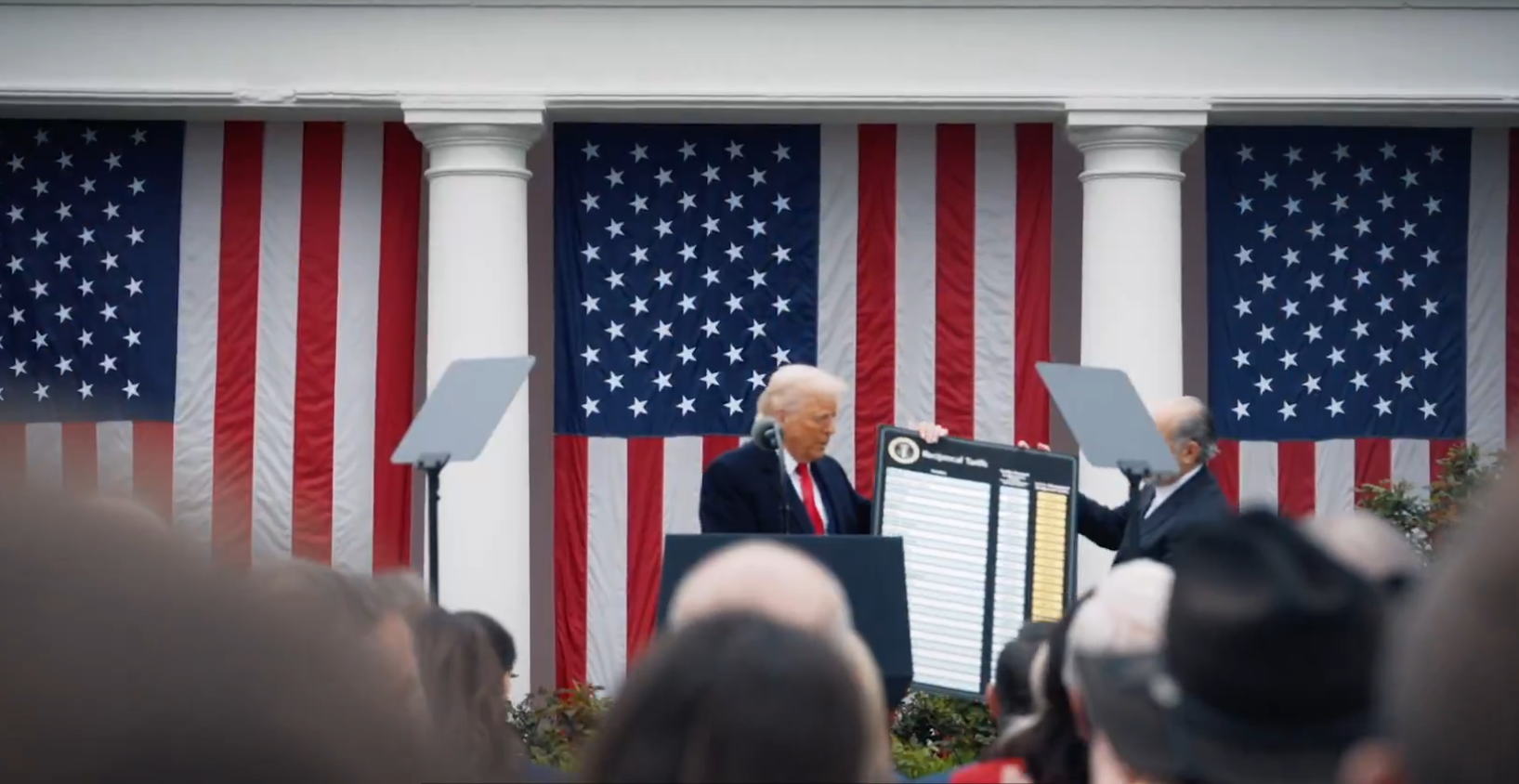Photo of President Trump holding up lists of tariffs on “Liberation Day” courtesy of the White House X (formerly known as Twitter) account.
Rethinking Tariffs As a Tool For Fair Trade
Two leading fair-trade experts, Lori Wallach and David Korten, look at what is broken in the global economy and what tariffs can and cannot do to help.
Just hours after President Trump announced new, high, and sweeping tariffs on Apr. 2, nearly all global financial markets’ indexes plummeted. The following week, the president announced that he would pause many of his new tariffs for 90 days. In their place he imposed a 10 percent blanket tariff on most U.S. trading partners and increased tariffs on Chinese imports to 40 times the 2018 tariff rates. These new tariffs would be in addition to the 25 percent tariffs that the president had already imposed on cars, steel and aluminum.
The Trump Administration argues these tariffs are necessary to rectify imbalanced trade relationships where U.S. market openness has not been reciprocated. The Administration also views tariffs as a revenue source for planned tax cuts.
David Korten, co-founder of YES! magazine and author of When Corporations Rule the World, describes Trump’s use of tariffs as “swashbuckling” and imposed on “both friends and foe.” But while many policymakers define all use of tariffs as bad for U.S. consumers, bracing themselves for rising prices and falling returns in markets, Korten argues that tariffs are not inherently bad “if they are about well-being of people, not corporations.”
Another trade policy expert, Lori Wallach, founder of Citizens Trade Campaign, has a similar assessment of Trump’s on-again, off-again tariffs, describing them as “incoherent” and “targeting the wrong countries and goals.” Both Wallach and Korten say that Trump’s erratic behavior should not discredit the use of tariffs paired with investment. And both trade policy experts agree that Trump is attempting to use tariffs to address damage done by decades of trade deficits that deindustrialized the United States and fueled income inequality.
“Donald Trump won the 2024 presidential election by playing to the anger of working-class Americans who have suffered from the effects of the global economy,” Korten said — an economy organized in the 1990s around the North American Free Trade Agreement (NAFTA) and the World Trade Organization (WTO) that sought to “maximize corporate profits at the expense of people and planet.”
Korten and Wallach point to the U.S. trade deficit with Mexico and Canada and the substantial U.S. job losses attributed to NAFTA outsourcing as reasons for U.S. voters’ anger. Long and fragile supply chains, trade deficits, desperate workers, and environmental degradation have become hallmarks of the unhealthy global economy.
Tariffs can help fix this mess, both Wallach and Korten say, but only if they are used strategically, on a case-by-case basis. For example, Wallach points to tariffs President Biden imposed on Chinese solar panels made by forced labor and tariffs against shrimpers in India and Vietnam, where shrimp is grown in unsanitary ponds with subsidies and horrific labor conditions. Tariffs can make the practices not worth the cost, and the United States should coordinate its tariffs alongside other countries to maximize pressure something the go-it-alone Trump Administration has not done, Wallach says.
Wallach supports a strategy used by the Biden Administration to pair tariffs with other policy tools. For example, the Inflation Reduction Act created demand for U.S.–made products like electric vehicles and solar equipment through more government purchases and consumer tax credits.
Korten proposes shifting the goals of trade policy toward cooperation and a “global fair-trade agenda” that supports local resilience, worker wellbeing, and environmental health. That agenda would entail “abandoning both the free-trade agenda AND (use of) tariffs as a tool for competition and GDP growth.”
Korten suggests strategically using tariffs to discourage environmentally damaging high-carbon-footprint products as well as those produced under exploitative conditions. He also believes tariffs can support local food networks, reducing dependency on fragile supply chains.
But as Wallach says, “even when properly targeted and enforced, tariffs only work if they are predictable and sustained. Trump’s tariff roller coaster sends the opposite message.”
This is why, when considering tariffs, it matters to ask “why?” and “for whom?” Korten says. “We need a much deeper and more nuanced debate.”
Faith in action: Learn more about tariffs and trade policy from David Korten at http://www.davidkorten.org and Lori Wallach at http://www.rethinktrade.org. Listen to Wallach’s podcast “Rethinking Trade” on her website and on Spotify. Watch her webinar “Tariff Policy, Politics, and Messaging” featuring Rep. Debbie Dingell (D-Mich) and Rep. Chris Deluzio (D-PA) on her YouTube channel https://www.youtube.com/@RethinkTrade.

